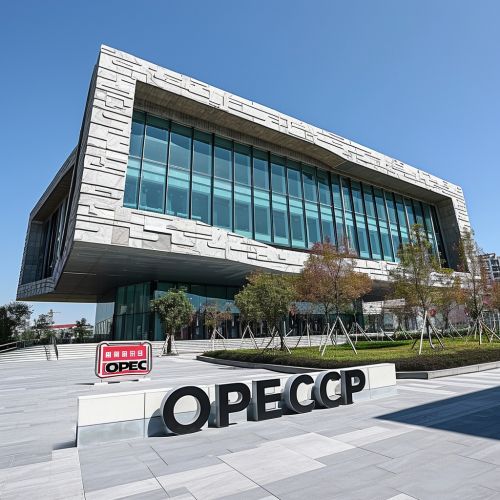Organization of Petroleum Exporting Countries
Introduction
The Organization of Petroleum Exporting Countries (OPEC) is an intergovernmental organization composed of 13 nations, primarily located in the Middle East, Africa, and South America. Established in Baghdad, Iraq, on September 14, 1960, by Iran, Iraq, Kuwait, Saudi Arabia, and Venezuela, OPEC's mission is to coordinate and unify petroleum policies among member countries to secure fair and stable prices for petroleum producers.

History
OPEC was established in response to the dominance of multinational oil companies in the global oil market, which often left oil-producing countries with a small share of oil revenues. The founding members, Iran, Iraq, Kuwait, Saudi Arabia, and Venezuela, sought to create a platform to negotiate with these companies and ensure their national interests were protected. The organization has since grown to include 13 member countries, which collectively hold approximately 82% of the world's proven oil reserves.
Structure and Membership
OPEC operates on the principle of unanimity, and decisions are made by the Conference, the supreme authority of the organization. The Conference consists of delegations headed by the oil ministers of member countries and meets at least twice a year. The Secretariat, headed by the Secretary General, is the executive organ of the organization and carries out the executive functions.
Membership in OPEC is open to any country that is a substantial exporter of oil and shares the ideals of the organization. As of 2021, OPEC consists of 13 member countries: Algeria, Angola, Congo, Equatorial Guinea, Gabon, Iran, Iraq, Kuwait, Libya, Nigeria, Saudi Arabia, the United Arab Emirates, and Venezuela.
Role in the Global Oil Market
OPEC plays a significant role in the global oil market by coordinating the petroleum policies of its member countries. By adjusting their collective oil production, OPEC member countries can influence global oil prices. This power has been used to stabilize the oil market during periods of volatility and to exert economic and political influence on a global scale.
Criticism and Controversies
OPEC has faced criticism for its role in the global oil market. Critics argue that the organization's ability to influence oil prices amounts to a monopoly, and that it has used this power to manipulate the market to its advantage. OPEC has also been accused of contributing to economic instability in countries that rely heavily on oil imports.
Impact and Influence
Despite criticism, OPEC's influence on the global oil market is undeniable. The organization's decisions can have significant impacts on the global economy, and its actions have shaped the course of history. From the 1973 oil embargo, which led to a global energy crisis, to the 2020 oil price war, OPEC's actions have had far-reaching implications.
